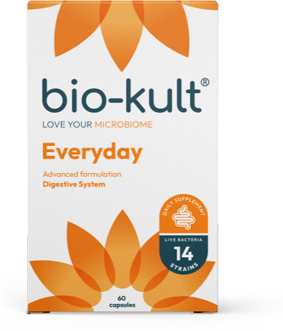
One possible reason for this rise could be due to something called the ‘biodiversity theory’. This theory is based on the fact that we have lost so much bio-diversity from the natural environment and moved away from traditional ways of living. The changes in the way we live (mostly indoors, with little exposure to animals, grass and dirt!).
The bio-diversity theory suggests that the drop in exposure to outside microorganisms, impacts how our immune system works.2 The default reaction that our immune system have is to react or attack, and interpret pollen as dangerous. This results in itchy and watery eyes, a sniffly nose and coughs and sneezes, in an attempt to ‘wash’ out the pollen from the system.
However, there are a number of things you can do to support your immune system, helping it to develop a higher tolerance to the outside world.
Increase anti-inflammatory foods
The phytonutrient quercetin is known for its anti-allergic properties, and is therefore a useful addition to any anti-allergy diet.3 The main food sources are vegetables such as onions, garlic and broccoli, fruits such as apples, berries and grapes, some herbs and green and black tea.
Quercetin appears to work synergistically with vitamin C,4 so topping up on lots of vitamin C rich foods such as broccoli, kiwi, strawberries, peppers and parsley is a good idea. Vitamin C is also an antioxidant, and studies have found that children with increased vitamin C consumption had fewer hay fever symptoms.5 The increased incidence of allergic conditions has also been associated with the over-consumption of pro-inflammatory omega-6 fatty acids, found in grains, vegetable oils, grain-fed meat and processed foods, in relation to antiinflammatory omega-3 fatty acids.6 Reducing foods high in omega 6 and increasing omega-3 fatty acid-rich food such as oily fish (such as salmon, mackerel and sardines), game meats, hemp, flax and chia seeds, may be beneficial.
Reduce inflammatory foods: Eliminating or reducing pro-inflammatory foods, such as sugar, refined carbohydrates, hydrogenated vegetable oils and transfats from processed foods is also advisable. Avoid consuming ultra-processed foods and instead prepare meals and snacks from scratch, where you can. There is also some evidence to suggest high arachidonic acid intake (found in meat and dairy) may contribute to the development of hay fever and other allergic diseases.7 You may therefore choose to limit intake of these foods and switch to some healthy plant-based proteins such as lentils, quinoa, beans, nuts and seeds.
Try a course of acupuncture: Increasing evidence suggests that acupuncture may help to modulate the immune system,8 with potential benefits in allergic conditions.
Consume fermented foods daily: It is thought that fermented foods containing lactic-acid producing bacteria are able to support and regulate the immune system.9 Traditionally fermented foods such as sauerkraut, kimchi, kefir, live yoghurt, miso and kombucha all contain good levels of lactic-acid producing bacteria.
Take a vitamin D supplement: Vitamin D deficiency is a common issue and may be an important risk factor in the development of allergic disease. When hay fever begins in spring, many people’s reserves of vitamin D may be low following the winter months. Supplementing vitamin D over the winter months is recommended for all individuals in the UK10 and can help ensure adequate levels come hay fever season.
 Take a live bacteria supplement: Around 70% of our active immune cells reside in the digestive tract, and are supported and influenced by a diverse range of gut bacteria.11 Research suggests that live bacteria supplements, such as Bio-Kult Everyday (RRP £10.48 for 30 capsules, available to buy from www.bio-kult.com), may benefit hay fever sufferers via interactions with the immune system, which modify the natural course of allergic disease.12 A 2017 study found that supplementing with a multi-strain live bacteria formula, containing Lactobacilli and Bifidobacterium species for 8 weeks, helped to alleviate hay fever symptoms and improved quality of life during allergy season in hay fever sufferers.13 Similar studies in 201414 and 2011,15 also reported significant improvements in those supplementing with Lactobacilli, in particular a reduction in runny eyes,14 lower nasal congestion and itching, as well as lowered inflammation and a reduced immune response.15 By Liz Cooper, Nutritionist at Bio-Kult (www.bio-kult.com)
Take a live bacteria supplement: Around 70% of our active immune cells reside in the digestive tract, and are supported and influenced by a diverse range of gut bacteria.11 Research suggests that live bacteria supplements, such as Bio-Kult Everyday (RRP £10.48 for 30 capsules, available to buy from www.bio-kult.com), may benefit hay fever sufferers via interactions with the immune system, which modify the natural course of allergic disease.12 A 2017 study found that supplementing with a multi-strain live bacteria formula, containing Lactobacilli and Bifidobacterium species for 8 weeks, helped to alleviate hay fever symptoms and improved quality of life during allergy season in hay fever sufferers.13 Similar studies in 201414 and 2011,15 also reported significant improvements in those supplementing with Lactobacilli, in particular a reduction in runny eyes,14 lower nasal congestion and itching, as well as lowered inflammation and a reduced immune response.15 By Liz Cooper, Nutritionist at Bio-Kult (www.bio-kult.com)2. Haahtela T. A biodiversity hypothesis. Allergy 2019; 74: all.13763.
3. Mlcek J, Jurikova T, Skrovankova S, Sochor J. Quercetin and Its Anti-Allergic Immune Response. Molecules 2016; 21:623.
4. Askari G, Ghiasvand R, Feizi A, Ghanadian SM, Karimian J. The effect of quercetin supplementation on selected markers of inflammation and oxidative stress. J Res Med Sci 2012; 17: 637-41.
55. Seo J-H, Kwon S-O, Lee S-Y, et al. Association of antioxidants with allergic rhinitis in children from seoul. Allergy Asthma Immunol Res 2013; 5: 81-7.
6. Dinicolantonio JJ, O’keefe J, O’keefe JH. The Importance of Maintaining a Low Omega-6/Omega-3 Ratio for Reducing the Risk of Autoimmune Diseases, Asthma, and Allergies. Mo Med 2021; 118: 453.
7. Kompauer I, Demmelmair H, Koletzko B, Bolte G, Linseisen J, Heinrich J. Association of fatty acids in serum phospholipids with hay fever, specific and total immunoglobulin E. Br J Nutr 2005; 93: 529-35.
8. Liang F, Cooper EL, Wang H, Jing X, Quispe-Cabanillas JG, Kondo T. Acupuncture and Immunity. Evid Based Complement Alternat Med 2015; 2015: 260620.
9. Cross ML, Stevenson LM, Gill HS. Anti-allergy properties of fermented foods: an important immunoregulatory mechanism of lactic acid bacteria? Int Immunopharmacol 2001; 1: 891-901.
10. Statement from PHE and NICE on vitamin D supplementation during winter - GOV.UK. https://www.gov.uk (accessed Jan 19, 2021).
11. Vighi G, Marcucci F, Sensi L, Di Cara G, Frati F. Allergy and the gastrointestinal system. Clin Exp Immunol 2008; 153 Suppl 1: 3-6.
12. Yan F, Polk DB. Probiotics and immune health. Curr Opin Gastroenterol 2011; 27: 496-501.
13. Dennis-Wall JC, Culpepper T, Nieves C, et al. Probiotics (Lactobacillus gasseri KS-13, Bifidobacterium bifidum G9-1, and Bifidobacterium longum MM-2) improve rhinoconjunctivitis-specific quality of life in individuals with seasonal allergies: a double-blind, placebo-controlled, randomized trial. Am J Clin Nutr 2017; 105: 758-67.
14. Costa DJ, Marteau P, Amouyal M, et al. Efficacy and safety of the probiotic Lactobacillus paracasei LP-33 in allergic rhinitis: a double-blind, randomized, placebo-controlled trial (GA2LEN Study). Eur J Clin Nutr 2014; 68: 602-7.
15. Wassenberg J, Nutten S, Audran R, et al. Effect of Lactobacillus paracasei ST11 on a nasal provocation test with grass pollen in allergic rhinitis. Clinical & Experimental Allergy 2011; 41: 565-73.







